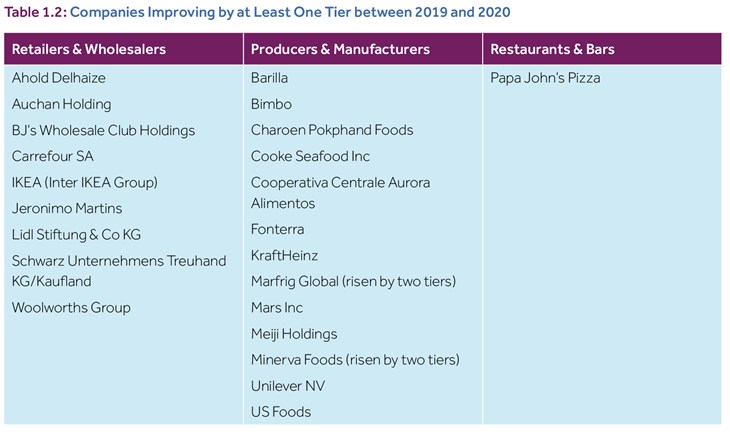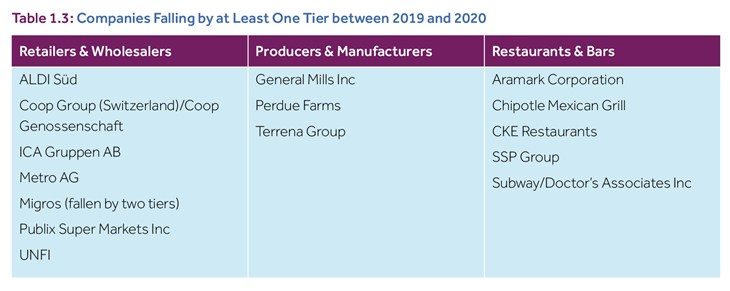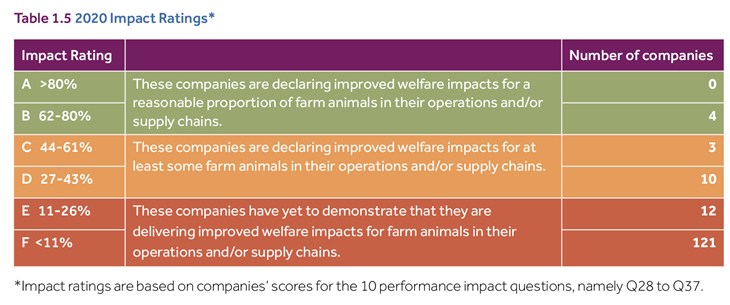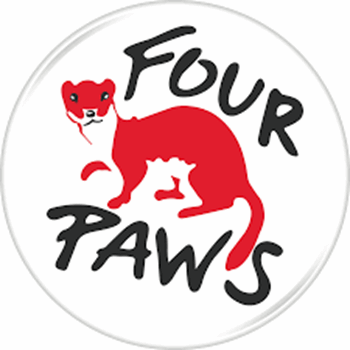Today (30th March) sees the launch of the ninth annual Business Benchmark on Farm Animal Welfare (BBFAW), an annual review of how the world’s leading food companies are managing and reporting their farm animal welfare policies, practices and performance.

In 2020, 150 global food companies were assessed and, for the first time in the Benchmark’s history, food producers and manufacturers were the highest scoring sub-sector on farm animal welfare with an overall average score of 38%, compared to scores of 36% for retailers and wholesalers, and 31% for restaurants and bars.
In total, 23 companies moved up at least one tier, which is remarkable against the backdrop of the pandemic – a year which has been particularly challenging for the food service sector.
Nicky Amos, Executive Director of the Business Benchmark on Farm Animal Welfare, said: “The 2020 findings show how BBFAW is driving corporate action on farm animal welfare, with around two-thirds of companies actively managing the business risks and opportunities associated with farm animal welfare, and 79% of companies having committed to improvement objectives and targets linked to farm animal welfare.
“The progress made by companies on managing farm animal welfare since the BBFAW’s inception 2012 is remarkable and should be applauded. However, as BBFAW enters its tenth year, our expectation is that companies need to demonstrate how their management commitments are translating into improved welfare impacts for animals on the ground.”
2020 HIGHLIGHTS
- 150 global food companies across 24 countries were included in the 2020 benchmark assessment, comprising:
- 52 food retailers and wholesalers
- 63 food producers
- 35 restaurants and bars
- 23 companies moved up at least one tier in the Benchmark ranking since 2019
- Cranswick, Marks & Spencer, Noble Foods and Waitrose are confirmed as global leaders on farm animal welfare, appearing in Tier 1 of the Benchmark
- 23 of the 150 companies benchmarked are ranked in the top 2 Tiers of the Benchmark, showing animal welfare is integral to their business
- 91 of the 150 companies benchmarked are ranked in Tiers 1-4, demonstrating they are now actively managing the business risks and opportunities associated with farm animal welfare
- Food producers are the most represented sub-sector in Tiers 1 and 2 of the 2020 Benchmark (12 companies): – Barilla, Cargill, Cranswick, Danish Crown, Groupe Danone, Fonterra, Hilton Food Group, Marfrig Global, Nestlé, Noble Foods, Premier Foods and Unilever – showing leadership on farm animal welfare
- 39% of companies remain in the bottom two tiers, offering little or no information on their approach to farm animal welfare
- 21% have still not published overarching policies on farm animal welfare
- 89% have yet to demonstrate that they are delivering improved welfare impacts for farm animals on the ground
COMPANIES ON THE MOVE
Companies improving their score by at least one tier between 2019 and 2020:
- 13 companies in the ‘producers and manufacturers’ sub-sector
- 9 companies in the ‘retailers and wholesalers’ sub-sector
- 1 company in the ‘restaurants and bars’ sub-sector

Companies falling by at least one tier between 2019 and 2020:
- 3 companies in the ‘producers and manufacturers’ sub-sector
- 7 companies in the ‘retailers and wholesalers’ sub-sector
- 5 company in the ‘restaurants and bars’ sub-sector

REGIONAL ANALYSIS
The total number of countries of origin covered by the BBFAW in 2020 remained at 24: 34% are based in Europe, 33% are based in North America, 13% in Asia Pacific, 13% in the UK, and 7% in Latin America.
The 2020 Benchmark reveals momentum is building in Latin America and Asia Pacific regions that include some of the biggest names in global meat production. Analysis here shows noteworthy changes in the overall average score for producer companies in Latin America, whose overall average score rose from 29% in 2019 to 40% in 2020.
In Asia Pacific, producers in the region saw year-on-year scores improve from 21% to 27% in the Management Commitment section and from 14% to 18% in the Governance and Management section. However, it is worth noting that this rise is from a very low base, and the average overall score for these companies increased from 12% to 16% in 2020.
UK domiciled companies, with an average score of 64%, continue to outperform companies in other geographies. The second highest-scoring region remains Europe (excluding the UK), which achieved an average score of 40%.
BBFAW METHODOLOGY
Whilst 79% of global food companies have set farm animal welfare-related objectives and targets, we have yet to see this reflected in improved welfare impact disclosure for animals across their operations and supply chains.
This year’s methodology was updated to place a greater emphasis on welfare impacts for farm animals. The ten ‘Performance Impact’ questions assessing company performance on species-specific welfare issues now account for 60% of the overall weighting of the Performance Reporting and Impact section.
Company reporting on welfare impact however remains immature. For example, the 2020 baseline Impact Ratings show there are few companies achieving Impact Ratings A-E.

CONTINUED PROGRESS
Given the tightening of the benchmark methodology and assessment approach in 2020, it is encouraging to see the overall average score has continued to increase, marginally, to 35% in 2020, from 34% in 2019 – indicating that animal welfare has continued to receive sustained management attention.
89% of companies benchmarked now acknowledge farm animal welfare as a business issue, compared to just 71% in 2012 and 79% have formal overarching policies on farm animal welfare, compared to just 46% in 2012.
Read the full 2020 BBFAW report here.
BBFAW WELCOMES FOUR PAWS

This year, BBFAW welcomes Four Paws, the global animal welfare organisation for animals under direct human influence, as a supporting partner. Four Paws will take over the role of funding partner from World Animal Protection who, alongside Compassion in World Farming, has steered the BBFAW since its inception in 2012.
Four Paws and Compassion in World Farming will continue to play an instrumental role in providing the BBFAW programme with technical expertise, guidance, funding and practical resources as the programme enters its second decade.
Compassion’s Global CEO, Philip Lymbery, said: ““This is the ninth annual BBFAW report and I’d like to thank our co-sponsors, World Animal Protection for sharing the journey with us since 2012, during which time we have seen extraordinary company progress.
“The current pandemic has been deeply challenging for everyone, particularly for the hospitality sector, and at the same time, has underlined the need for progressive change toward healthier, more resilient animal-welfare friendly food systems. The need to convert effective policies into practice has never been more urgent.
“As the 2020 Benchmark demonstrates, giving greater weight to the implementation of progressive practices has become a key corporate performance indicator on animal welfare and thereby health, which will remain important going forward.”
To find out more about the Benchmark visit www.bbfaw.com.